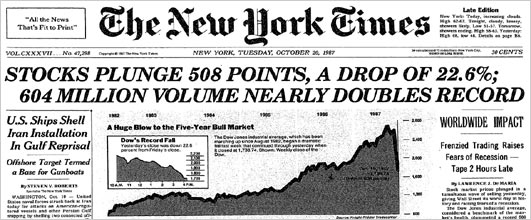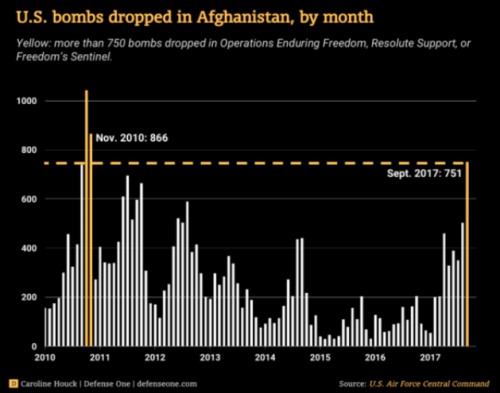Steve Bull's Blog, page 1285
October 16, 2017
Elites ‘Have No Credibility Left’: Interview With Journalist Chris Hedges

Pulitzer Prize winner and Truthdig columnist Chris Hedges. (Cheryl Biren / CC BY-NC-ND 2.0)
On Monday, WSWS International Editorial Board Chairman David North interviewed Chris Hedges, the Pulitzer Prize-winning journalist, author, lecturer and former New York Times correspondent. Among Hedges’ best-known books are War is a Force That Gives Us Meaning, The Death of the Liberal Class, Empire of Illusion: the End of Literacy and the Triumph of Spectacle, Days of Destruction, Days of Revolt, which he co-wrote with the cartoonist Joe Sacco, and Wages of Rebellion: the Moral Imperative of Revolt.
In an article published in Truthdig September 17, titled “The Silencing of Dissent,” Hedges referenced the WSWS coverage of Google’s censorship of left-wing sites and warned about the growth of “blacklisting, censorship and slandering dissidents as foreign agents for Russia and purveyors of ‘fake news.’”
Hedges wrote that “the Department of Justice called on RT America and its ‘associates’—which may mean people like me—to register under the Foreign Agent Registration Act. No doubt, the corporate state knows that most of us will not register as foreign agents, meaning we will be banished from the airwaves. This, I expect, is the intent.”
North’s interview with Hedges began with a discussion of the significance of the anti-Russia campaign in the media.
David North: How do you interpret the fixation on Russia and the entire interpretation of the election within the framework of Putin’s manipulation?
Chris Hedges: It’s as ridiculous as Saddam Hussein’s weapons of mass destruction. It is an absolutely unproven allegation that is used to perpetuate a very frightening accusation—critics of corporate capitalism and imperialism are foreign agents for Russia.
…click on the above link to read the rest of the article…
October 15, 2017
With Just Hours Until Spain’s Ultimatum Runs Out, Catalonia Proposes Its Own Central Bank
It’s D-Day for Catalan President Carles Puigdemont who has just a few hours left until 10 am on Monday (4am ET) to respond to the Spanish government’s ultimatum delivered last week by the prime minister, demanding to know whether Puigdemont did, indeed, declare independence last week. If Puigdemont says yes, fails to respond, or provides another meandering answer, Rajoy will start the process under Article 155 to seize control of the breakaway administration in the coming weeks.
While Catalan television station TV3, which is controlled by the regional government, said Puigdemont will not give Rajoy a clear ‘Yes’ or ‘No’ according to Bloomberg, shortly after Jordi Sanchez, leader of separatist group Catalan National Assembly, denied the report and said that, after speaking to Puigdemont on Sunday, the Catalan reply to Rajoy “will be clear.” Speaking to Spanish broadcaster La Sexta, Sanchez said he agrees 100% with Puigdemont’s reply to Spanish Prime Minister Mariano Rajoy, and that the response will be dignified and clear with no surprises, adding that a will for dialogue exists but the Catalan government will not renounce mandate given by the Oct. 1 independence referendum.
Meanwhile, El Mundo reported that Spain’s central government in Madrid is weighing two options it may impose on Catalonia if the region’s government unequivocally declares independence, El Mundo reported, without saying where it got the information. Madrid would either name a caretaker administration or a unity government made up of representatives of all parties, the newspaper said per Bloomberg. Regional elections would then be called in three to six months, according to the report. It adds that while Replacing the rebel government would require the state using special powers under Article 155 of the Spanish Constitution. that action is not imminent, and may not be taken if the Catalan government demonstrates it hasn’t broken away from Spain and instead will abide by Spanish law.
…click on the above link to read the rest of the article…
Eric Peters: “This Is The Nightmare Scenario For The Next Fed Chair”
While we will have much more to share from the latest weekend letter by One River’s Eric Peters shortly, we found the following section on inflation vs asset bubbles – a topic which BofA’s Michael Hartnett has been focusing extensively on in the past year and which serves as the basis for the “Icarus Rally” – particularly notable as it explains all of today’s comments from Janet Yellen and other central bankers, discussing why it is only a matter of time before inflation returns, as the alternative, as Peters’ explains, is a world in which yields simply refuse to go up, leading to a nightmare scenario for the next Fed chair, who will be forced to pop the world’s biggest asset bubble.
Excerpted from the latest weekend notes by One River CIO, Eric Peters:
“Why are we not experiencing deflation?” he asked. “How can the top five stocks in the Nasdaq reduce US GDP but we feel better off?” he asked. “Why are Americans buying no more cars today than in 1978 when our population is 100mm higher?” he asked. “Why compare today to a world of combustion engines when we have so many more interesting things to do without moving an inch?” he asked.
“And why do central banks create endless bubbles to restore an inflation rate from that ancient time?” he asked. “Why is that not the right question?”
“Global profits are rising, unemployment is falling, growth is up, wages too,” said the strategist.
“Yet bond yields seem unable to jump.” US 10yr bond yields are 2.27%, Germany 0.40%, Japan 0.05%. “The cyclical surprise is that the Phillips curve finally kicks in, just as everyone gives in.” US unemployment is 4.2%, a 17yr low. Germany 3.6%, a 37yr low. Japan 2.8%, a 23yr low. “And the biggest structural surprise is that technology has rendered wage inflation a phenomenon for the history books.”
…click on the above link to read the rest of the article…
ECB Suffers from “Corporate Capture at its Most Extreme”
Many of these banks are implicated in the biggest financial crimes.
No single institution has more influence over the lives of European citizens than the European Central Bank. It sets the interest rates for the 19 Member States of the Eurozone, with a combined population of 341 million people. Every month it issues billions of euros of virtually interest-free loans to hard-up financial institutions while splashing €60 billion each month on sovereign and corporate bonds as part of its QE program, thanks to which it now boasts the biggest balance sheet of any central bank on Planet Earth.
Through its regulatory arm, the Single Supervisory Mechanism, it decides which struggling banks in the Eurozone get to live or die and which lucky competitor gets to pick up the pieces afterwards, without taking on the otherwise unknown risks.
In short, the ECB wields a bewildering amount of power and influence over Europe’s financial system. But how does it reach the decisions it makes? Who has the ECB’s institutional ear?
The ECB has 22 advisory boards with 517 seats in total that provide ECB decision-makers with recommendations on all aspects of EU monetary policy. A new report by the non-profit research and campaign group Corporate Europe Observatory (CEO) reveals that 508 of the 517 available seats are assigned to representatives of private financial institutions.
In other words, 98% of the ECB’s external advisors have some sort of skin in the game. Of the nine seats not taken by the financial sector, seven have gone to non-financial companies such as German industrial giant Siemens and just two to consumer groups, according to the CEO report.
In response to questions by CEO, the ECB said that its advisory groups help it to gather information, effectively “discharge its mandate”, and “explain its policy decisions to citizens.”
…click on the above link to read the rest of the article…
October 14, 2017
Personal Recollections of the Crash of 1987

Personal Recollections of the Crash of 1987
The following guest post is a first-hand account of the events surrounding the Crash of 1987 by JLFMI President, John S. Lyons.
Personal Recollections of the Crash of 1987 on its 30th Anniversary
“There was no ‘smart money’ that day.”
What do the assassination of President John F Kennedy, the beginning of Desert Storm and 9/11 have in common? Provided you are old enough to recall JFK’s assassination, the answer probably is that you remember exactly where you were on the day of those events. If not that old, there is most likely another event that is so memorable that you recall where you were and what you were doing at that moment.
Being in the securities business for many, many years, the Crash of ’87 on October 19th of that year is right up there with JFK’s assassination and 9/11 as one of the mind-numbing catastrophes I’ve witnessed. In retrospect only, it was fortunate that I had entered the brokerage business in 1969 and immediately weathered a 36% market decline into 1970. On the heels of that decline, I then endured one of the worst bear markets in modern history in 1973-74 when the Dow Jones Industrial Average lost almost 50% of its value. As a result, I was weaned on risk in my new profession. And I learned early on that if a career that centered around the stock market were to be endurable, I had to find a way to practice risk management.
As a result, I developed a risk model during the 1970’s as a means of guarding against such disastrous losses in the future. Fortunately, the model has been of very valuable assistance, protecting clients from every major decline since its inception in 1978.
…click on the above link to read the rest of the article…
Survey Find Americans’ Views on Free Speech is a Whole Bunch of Crazy

Survey Find Americans’ Views on Free Speech is a Whole Bunch of Crazy
The biggest thing this survey proves is that Orwellian double-speak is working.
If you are unfamiliar, doublespeak is a term from the novel 1984. It is speech intentionally meant to confuse, or obscure reality.
What does free speech mean? What is hate speech? And what laws currently or should exist in regards to speaking freely?
The answers from Americans prove just how successful the media and politicians have been in making Americans less grounded than a satellite.
The powers that be have successfully confused and obscured any hint of rationality in beliefs. There seems to be little method and all madness. People simply make up their minds emotionally, instead of thinking critically. And that is how those in power like it.
When people behave emotionally, they are more easy to control. A rational belief would be something along the lines of Evelyn Beatrice Hall’s “I do not agree with what you have to say, but I’ll defend to the death your right to say it.”
An irrational belief would be that anything that offends you should not be called free speech.
Those who believe the latter fail to understand that practically anything can be considered offensive to someone. Under those circumstances, politicians could limit any kind of critical speech, claiming it promotes violence, offends, or is hate speech.
Holding Two Contradictory beliefs
An overwhelming majority of Americans believe that “it would be hard to ban hate speech because people can’t agree what speech is hateful,” …
Yet a majority of Americans and a supermajority of African Americans believe that “society can prohibit hate speech and still protect free speech.” (To complicate matters, a quarter of Americans, 38 percent of African Americans, and 45 percent of Latinos erroneously believe it is already illegal to make a racist statement in public.)
…click on the above link to read the rest of the article…
US Reaper Drone Shot Down Over Afghanistan
In a rare, successful attack on one of the most advanced US offensive weapons, a US drone has reportedly been shot down over Afghanistan. The Islamic Emirate of Afghanistan (Voice of Jihad) reports that Mujahideen of the Islamic Emirate shot down an unmanned aerial vehicle (UAV) said to be operated by the United States. The rea
The UAV above is believed to be a MQ-9 Reaper with a price tag of $10.5 million. The aircraft can stay airborne up to 36 hours with 1.7 tons of missiles and bombs. The wreckage of the plane is said to have been seized by the Mujahideen. So far, there has been no comment from from the US military.
The location of the downed drone is in Kunduz, a city in northern Afghanistan.
The attack may have been in retaliation for a US drone strike which yesterday killed 14 ISIS militants in the Kunar province, a northern boarder region in Afghanistan. According to The Guardian, “Abdul Ghani Musamim, a spokesman for the provincial governor, told the Associated Press that the drone had targeted a meeting of Isis commanders who were planning a terrorist attack.”

Apropos, on Thursday, we reported U.S. bombs dropped in Afghanistan surged to a 7-year high in the month of September, as it became clear that Trump’s Afghanistan war policy was simply to add to the local death toll by dropping more bombs.
As discussed before, we suspect that President Trump, gradually settling in into his role as the next “Warmonger-in-Chief” has reignited a trend that the military industrial complex is simply delighted about.
The Fed’s Massive Bubble Is Leading To Massive Economic Pain
There shouldn’t be a Federal Reserve, but it exists, and it’s constantly creating a world of economic pain.
Each Federal Reserve bubble must turn into a bust. It’s unavoidable.
According to the central planners, the “solution” for the bust is more creation of new money and credit. That’s the only way they can keep their “system” alive.
When the Fed’s stock market bubble burst in 2000, it responded by creating new money and credit. Lo and behold, this led directly to the next bubble that was even bigger.
When the housing bubble burst in 2008, Wall Street was bailed out by taxpayers, and TRILLIONS of new dollars were created as the “solution.”
And now, almost 10 years later, we have an even bigger bubble than 2008. The central planners at The Fed have done it again.
How much longer will we allow this “system” to last? How much economic pain will it take to return to sound money again?
Ron Paul discusses the latest bubble below:
Ron Paul’s ‘bubble’ warning from CNBC.
Canada’s Pipeline Industry Takes Another Hit
[image error]
Another oil pipeline in Canada bites the dust. TransCanada announced last week that it would scrap its plans to build a 2,800-mile major pipeline that would traverse nearly the entire country, closing off a crucial potential export route for Canada’s oil sands.
The $15 billion Energy East pipeline would have carried 1.1 million barrels of oil per day from Alberta to Canada’s eastern coast for refining and export. It faced significant opposition from communities affected along the pipeline’s route, but TransCanada had been confident that it could overcome those hurdles.
More recently, however, top Canadian regulators decided that the pipeline would need to face an assessment of the project’s impact on greenhouse gas emissions, a review that TransCanada fiercely opposed. Ultimately, it appears that the Canadian pipeline company shelved the project in light of the heightened environmental scrutiny.
Canada’s pipeline industry cried foul, blaming the government for regulatory uncertainty. “The common thread here is that Canada generally has displayed an unwelcoming policy environment and an uncertain approval process,” Explorers and Producers Association of Canada president Gary Leach, told the Financial Post, citing other billion-dollar projects that have been cancelled in the past year. “For Canada, I think this is a blow. We are deluding ourselves if we think Canada is a place with a stable, predictable investment climate.”
The lack of pipeline capacity is why so much onus has been put on Keystone XL, a pipeline that has been in limbo for the better part of a decade.
But the problem for TransCanada is that Energy East was always going to be a heavier lift than other projects. While some blame regulators for the death of Energy East, others see changing market conditions behind TransCanada’s decision to pull the plug. The project ran into trouble when oil prices cratered in 2014. Also, even with Keystone XL blocked, there are other projects that are more attractive than Energy East.
…click on the above link to read the rest of the article…
The Spanish Civil War, revisited

Catalan President Carles Puigdemont signs a declaration of independence at the Catalan regional parliament in Barcelona, on October Photo: Reuters/Albert Gea
The Spanish Civil War, revisited
Puigdemont’s political twist could invoke a lethal response from Madrid: suspension of Catalonia’s government
Call it theatre of the absurd – with a lethal subtext. Under pressure from all corners – even Donald Tusk, president of the EU Council – in his fateful date with destiny Carles Puigdemont, President of Catalonia, came up with some last-minute judo dialectics. He issued a non-denial denial Unilateral Declaration of Independence from Spain. What was declared was immediately suspended; the Republic of Catalonia lasted for six seconds.
The deft political gambit left Madrid predictably bewildered. Prime Minister Mariano Rajoy, a.k.a. nano-Franco, issued an ultimatum; you have five days to say if you declared independence or not.
Independent of the answer, Madrid’s nuclear option remains on the cards; infamous article 155 of the Constitution, which calls for the suspension of Catalonia’s government and parliament from six to 12 months.
Yet that may come with a twist; a 155 in slow motion, parallel to the hazy offer of starting a process, in six months maximum, leading to Spanish constitutional reform. Madrid needs Catalonia for this reform to succeed. So, essentially, Puigdemont just needs to say “no” for the train to start rolling.
It’s way more complex than it seems. The Catalan extreme left, up to the last minute, was trying to convince Puigdemont to proclaim unconditional independence. At the same time, those six seconds left Catalan unionists predictably furious. Moderates for their part prefer to see a faint light at the end of the tunnel.
The problem is that even with discreet back channels in place, Madrid’s strategy is to ultimately force a fissure in the independentist coalition; secession inside Catalonia to prevent secession from Spain.
…click on the above link to read the rest of the article…







